Lemelson-MIT Program
One of America's most prolific inventors, Jerome H. Lemelson (1923–1997), and his wife Dorothy, established the Lemelson-MIT Program at MIT in 1994. The program is administered by MIT at the School of Engineering under the guidance of director Merton Flemings, Toyota professor emeritus of materials processing, and executive director Kristin Finn. The mission of the program is to raise the stature of inventors and innovators and foster invention and innovation among young people.
Each year the Lemelson-MIT Program awards a series of prizes recognizing outstanding achievement in invention and innovation. Awards include the $500,000 Lemelson-MIT prize, the honorary lifetime achievement award, the $30,000 Lemelson-MIT student prize, and the high school invention apprenticeship.
The program also sponsors ongoing public education and informational activities designed to raise awareness about the importance of invention to the American economy. These include Inventing Modern America: From the Microwave to the Mouse, a book profiling the life and work of 35 prominent inventors; The Invention Dimension web site at http://web.mit.edu/invent, a clearinghouse for information on inventors and inventing; The Invention Index, an annual survey of Americans' perceptions about invention; and Inventory, a biannual newsletter promoting inventive creativity.
The Lemelson-MIT Program is part of the Lemelson national program in invention, innovation, and creativity, which funds initiatives at MIT, Hampshire College, the National Inventors and Innovators Alliance, the University of Nevada at Reno, and the National Museum of American History at the Smithsonian Institution.
Annual Invention Awards
The $500,000 Lemelson-MIT Prize
Presented to an outstanding living American inventor-innovator who has significantly benefited society, the Lemelson-MIT prize is the program's most prestigious and visible vehicle for creating excitement about invention and innovation. Called "the equivalent of the Oscars for inventors" by CNN, the prize is the world's largest single award for invention and innovation.
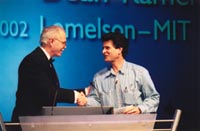 |
This year's prize recipient, Dean Kamen, was announced in San Francisco on April 23rd. Kamen was recognized for a number of inventions, including a portable dialysis machine; a wearable infusion pump that revolutionized drug delivery; the Independence™ IBOT™ mobility system, a stair-climbing wheelchair; and most recently, the self-balancing Segway™ human transporter. Kamen's inspiring career has been defined by two things— an intense commitment to enhancing human capabilities through technology and innovation; and a keen desire to excite high school students about invention, science, and engineering through FIRST robotics competitions.
Over 430 representatives from industry, academia, government, and the media attended the black tie event at the San Francisco Museum of Modern Art. MIT President Emeritus Paul Gray welcomed guests and Dean Thomas Magnanti presented the $500,000 prize.
The Lemelson-MIT Lifetime Achievement Award
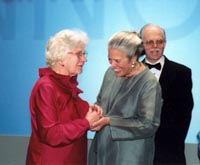 |
Designed to complement the $500,000 Lemelson-MIT prize, the lifetime achievement award recognizes a distinguished American inventor/innovator for lifelong contributions to invention or invention education.
Dr. Ruth Benerito was named this year's lifetime achievement award winner at the April 23rd ceremony at the San Francisco Museum of Modern Art. She was lauded for vital contributions that helped transform the textile, wood and paper industries. Her most notable achievement was the development of easy-care cotton—the precursor to "wash and wear" clothing.
The $30,000 Lemelson-MIT Student Prize
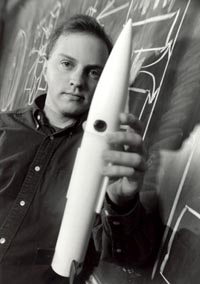 |
Given to an MIT student for remarkable inventiveness, the student prize recognizes a talented early career inventor and positive young role model. This year's recipient, Andrew Heafitz of Newton, Massachusetts, upheld the strong tradition of exceptional student prize winners. A 32-year old MIT doctoral candidate in mechanical engineering, Heafitz was honored at a press conference on March 6th. He won the prize for a variety of inventions, most notably his low-cost rocket engine and an aerial surveillance system designed for the US Army.
At one-tenth the cost of existing rocket engines, Heafitz's kerosene-liquid oxygen model uses a solar car motor to get it up to full speed before igniting. His experience and familiarity with solar-powered cars, which he builds and races as a hobby, prompted him to choose this type of motor as the focus of his master's thesis. Heafitz's aerial surveillance system is a soda can-sized device that transmits aerial reconnaissance pictures to a laptop computer. He is forming TacShot Inc. to produce these affordable devices.
The Lemelson-MIT High School Invention Apprenticeship
Awarded to a talented high school student inventor, the invention apprenticeship pairs the winning student with a professional "Invention Mentor" of the student's choice from a list provided by the program.
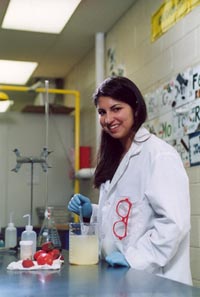 |
This year's Lemelson-MIT high school invention apprenticeship winner was Kavita Shukla, a 17-year old senior from Ellicott City, Maryland. Kavita's latest invention is an ecologically friendly packaging for fruits and vegetables that uses the herb fenugreek to retard spoilage. Kavita received a patent for her product this spring. She also holds a patent for Smart Lid, a lab safety device for bottles containing hazardous chemicals.
Kavita chose to work with David Payton, one of the nation's leading authorities in autonomous systems and robotics and principal scientist at HRL Laboratories in Malibu, California. Jointly owned by the Boeing Company, General Motors, and Raytheon Company, HRL Laboratories conducts research in electronics and information sciences, creating products for space, telecommunications, defense and the automotive industry. Announced on June 4th, the apprenticeship exposed Kavita to several innovative projects at HRL from June 3–21.
Outreach Activities and Events
Inventing Modern America, from the Microwave to the Mouse
With generous support from the Lemelson Foundation, we published Inventing Modern America: From the Microwave to the Mouse in time for holiday sales. Targeted for the young adult and adult audience, the book highlights American ingenuity and inventiveness through in-depth profiles of the life and work of 35 outstanding inventors. These lively, illustrated stories show American inventors to be as diverse and interesting as their inventions. The book's companion web site at http://www.inventingmodernamerica.com helps viewers explore the courage, insight, know-how, vision and perseverance of selected inventors. Two interactive games and "Facts from the Book" are fun features of this colorful and easy-to-navigate site.
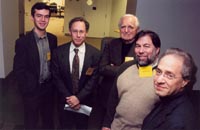 |
We celebrated the launch of the book with a panel discussion and reception on MIT's campus on November 27th. Interest in the panel discussion was strong, and we had to turn away guests from the packed 300-seat auditorium. Our all-star panel of inventors included Steve Wozniak, Robert Langer, Doug Engelbart, Ray Kurzweil, and Brian Hubert. Christopher Lydon, former NPR talk show host, orchestrated their discussion.
InvenTeam Grants
Our new grants program is designed for teams of high school students, their teacher, and a mentor from industry. The pilot phase of the program was introduced to New England secondary school science teachers on April 1, 2002 when 4,000 brochure/request for proposals were mailed out, and hundreds circulated via email. Brochures and application forms are also available online at http://web.mit.edu/invent/www/InvenTeam.html/
In June, we selected 10 semi-finalists who will develop final proposals after the start of school in September. In October 2002, we will select three finalists in diverse educational settings for grants up to $10,000 each. Their charge will be to invent something relevant to a problem in their school or community, and to present a working prototype by April 2003. We look forward to showcasing their work at next year's Lemelson-MIT awards ceremony and aspire to expand the program nationally in subsequent years.
In connection with InvenTeam grants, we are building a new component to our Invention Dimension web site that will support grant recipients, provide a mechanism for regular progress reporting to our program, and a communications link among teams. A one-day introductory workshop will be held at MIT next fall for participating teams.
MIT IDEAS Competition
The Lemelson-MIT program contributed $10,000 in prize money to the new MIT IDEAS competition, the brainchild of Amy Smith, 2000 winner of the Lemelson-MIT student prize, and the MIT Public Service Center. MIT IDEAS competition is designed to support innovative student projects that address community needs. The LMIT portion of the prize money was awarded for technological innovations in emerging countries. Director Merton Flemings officially presented two $5,000 prizes for a pair of winning projects on May 9th at the IDEAS awards ceremony on campus.
The first project was an inexpensive, portable incubator for premature infants designed to run without electricity. The second prize went to a group developing a drinking water treatment system for households in Bangladesh, West Bengal, and Nepal where arsenic and pathogens contaminate water supplies.
MIT E-Team Courses
The Lemelson-MIT Program provides a total of $110,000 in support of the following invention-related courses at MIT: 15.783J Product Design and Development taught by Steven Eppinger; 15.399 Entrepreneurship Lab taught by Kenneth Morse, John Preston, and Barbara Bund; and 2.009 Product Engineering Processes taught by David Wallace.
Organizational Changes
This year responsibility for the Lemelson-MIT Program shifted from the Sloan School of Management to the School of Engineering. Formerly under the guidance of Sloan professor Lester Thurow, the program is now directed by Merton C. Flemings, Toyota professor emeritus. Kristin Finn replaced Annmarie Amparo as executive director and offices were moved from the third floor to the second floor in Building E60. Staff increased by one and one-half employees to accommodate an increase in program activities.
More information about the Lemelson-MIT Program can be found on the web at http://web.mit.edu/invent/.